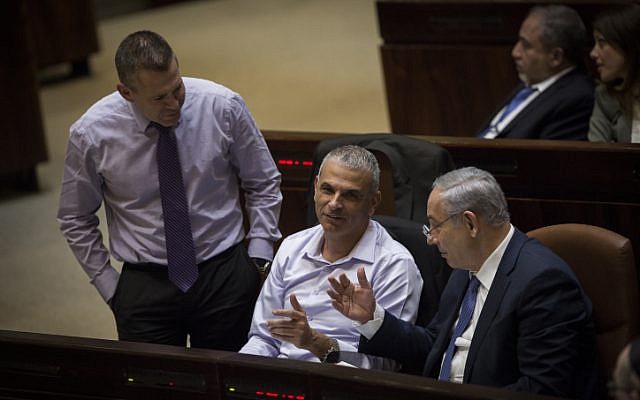After prime minister refuses to rule out so-called French Law, senior ministers and other party heads say no chance they will legislate to protect him from prosecution

Several political allies of Prime Minister Benjamin Netanyahu said Thursday they would not back an effort to pass a law giving the premier immunity from prosecution.
In a rare interview with Israel Radio on Thursday, Netanyahu balked when asked if he was against the so-called French Law, raising speculation that he may push for the legislation as a means of protecting himself from pending indictments in three cases.
“I’m not dealing with it, and that’s the truth, just like I haven’t dealt with other things,” he said when asked directly if he was against the law.
In response, several senior ministers said they would not back the law, including Public Security Minister Gilad Erdan from Netanyahu’s Likud party.
“He promised he wouldn’t try, and if a proposl like this comes up from others in the Knesset, I’ll oppose it,” Erdan told Army Radio.
Kulanu leader Moshe Kahlon, who helped torpedo a bid in 2017 by a Netanyahu ally in the Likud to pass an immunity bill, said he would continue to oppose it. “Everyone is equal under the law,” he told Army Radio.

Naftali Bennett, head of the New Right party, said that while he is in favor of immunity legislation, he would not back a law that would retroactively apply to the prime minister.
Yisrael Beytenu leader Avigdor Liberman, who is seen as a likely coalition partner for Netanyahu should he be tasked with forming the next government, also said he was against a retroactive measure.
He blamed speculation on Netanyahu seeking a measure on “the media.”
Under the so-called French law — named for similar legislation in France — police would be barred from investigating corruption suspicions against a prime minister, though it wouldn’t offer similar protection from suspicions relating to national security, sex crimes, violence or drugs.
In an interview with Channel 12 news last month, Netanyahu said he was not seeking legislation that would grant him immunity from graft charges, but did not shut the door on the possibility.

One potential lawmaker who said he would support an immunity measure was Itamar Ben Gvir of the United Right Wing Parties. In a recording aired by Channel 12 news Thursday night, Ben Gvir is heard saying if elected he will seek to lead the Knesset’s Constitution, Law and Justice Committee and use the position to fast-track such a measure.
Netanyahu played a key role in engineering the entrance of Ben Gvir, from the extremist Otzma Yehudit faction, into URWP.
Bezalel Smotrich, who heads another faction within the far-right URWP, said last month he would also push legislation to protect Netanyahu from prosecution.
In February, Attorney General Avichai Mandelblit announced his intention to indict Netanyahu, pending a hearing, on charges of bribery, fraud and breach of trust in three cases. The prime minister denies all the allegations.
While a sitting Israeli prime minister has never been this close to indictment before, Netanyahu is not obligated to resign at this stage. The planned indictment is still subject to a hearing, during which Netanyahu can plead his case before formal charges are filed.
Netanyahu may not need new legislation to protect himself. According to an existing law, Knesset members can be granted immunity if a majority of lawmakers are convinced the defendant has been treated unfairly and the charges are based on discrimination or a bad-faith effort.
As reported by The Times of Israel
